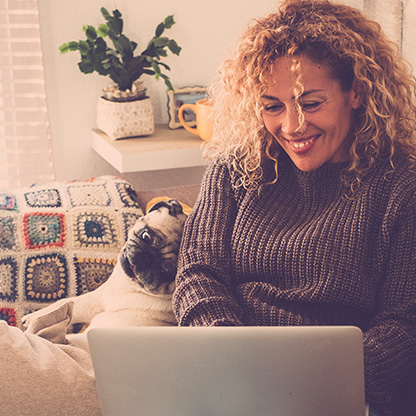When your child is old enough and you’re comfortable with them being online, here are five things you can do to help them learn about online safety.
1. Show and tell
It’s a case of practice what you preach when it comes to cyber security. Be your child’s role model and get them into the habit of following your lead. Show your child how you:
- Protect your information with passwords. Help them choose a strong, secure password then explain the importance of changing it regularly and why they shouldn’t share it with anyone
- Add additional security measures (often called two-factor authentication). Where your account is accessed by a password and by entering a verification code often sent to your phone – it’s worth introducing this concept to your child once they understand password security
- Protect your own identity online. Explain how public social media can be, and the importance of keeping your activity private and only connecting with people you know
- Online stranger danger. Talk to your child about choosing contacts, accepting requests, chatting online to people and sharing private information. This is a great opportunity to talk about online stranger danger
- Check and change settings. If your child’s old enough, explain that apps collect personal data – location, contacts – and send personal data from the phone. Get them into the habit of checking permissions and managing them.
2. Use parental controls
Being aware of your child’s online activity is crucial. If your child uses social networking sites, speak to them about being included in their contacts list so you can see what they’re posting, liking and commenting on. Think seriously about activating parental controls if they’re available - they can filter content, block access altogether, set limits (including payment limits) and restrict the amount of time spent online.
It’s your way to make sure your child isn’t falling into bad habits or being enticed into activities that put them in danger.
3. Browse together
When your child is young, it’s a good idea to go online or use an app together – whether you’ve got parental controls or not. It gives you the chance to demonstrate how to browse and search online as well as explain what your child should do if they stumble upon age inappropriate info (the reality is that’s going to happen at some point).
This gets trickier when your child’s a bit older though. So it’s a good idea to agree as a family when it’s OK to go online or use apps and if you can, it's great to be in the same room as your child during that time. Make sure you respect that rule too - don’t respond to emails or check your phone during family time.
4. Keep up-to-date
Keeping software updated is something that many parents forget to explain to their children. But this is just as important as warning your child about online stranger danger.
Consider making sure that the device your child uses reminds them to update software rather than relying solely on automatic updates in the background.
5. Knowing what’s safe. And not.
It’s important that your child knows how to check whether a site or an app is ‘safe’. Teach them to:
- Only download apps from official stores – App Store or Google Play
- Explain that some apps collect in-app payments and that costs can add up quickly
- Read user reviews and ratings to see if an app delivers a good experience
- Look out for secure sites that start with https – there will usually be a padlock and green bar to let you know the website is secure too - especially when they’re paying for things
- Watch out for cyber-bullying and what to do if it happens to them (or a friend of theirs).
While you’re discussing these important topics, it may be a good opportunity to explain that whatever they write or share online is there for life. It can’t be wiped away, deleted or easily ignored.
Keen to discover more about online safety for children?
- The Australian Government’s eSafety.gov.au
- CommBank's security tips
- ThinkUKnow program - you can book a free cyber safety session delivered by the police and industry experts.


